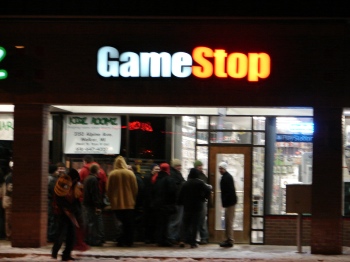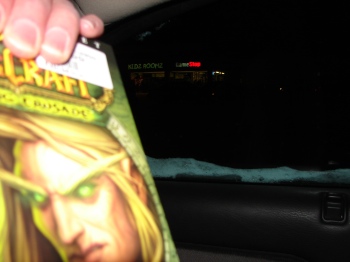Note: I don’t know where I’m going with this, but I feel like talking about vampires. You’ve been warned.
Call it the Year of the Undead, if you will. Thus far in 2007 I’ve read exactly two novels, and both of them were about vampires: Elizabeth Kostova’s The Historian, which was quite good, and Tim Powers’ The Stress of Her Regard, which was superb. I did not intentionally set out to read two books about the unquiet dead–I did not realize they had that subject in common until I cracked the covers–but I’m glad I did.
I’ve always found vampires to be fascinating, as far as unholy abominations go. I loved Stoker’s Dracula as a kid; Dracula served for years as the perfect model of the horror-story villain in my mind. He was cruel, vicious, and predatory; he was also patient, intelligent, and exceedingly clever. My favorite horror villains are those that simultaneously play on both existential and visceral fears, and Dracula did just that: on the one hand, he’s an unnatural, spiritually disturbing horror that casts doubt on everything we believe about life, death, and a benevolent God; and on the other hand, he’s a near-unstoppable physical threat that wants to punch holes in your throat with his teeth and suck the lifeblood from your body. (Other horror-story villains that fit this model are the creature from Alien, which I’ve discussed before, and Stephen King’s “It,” which manages to be both an alien cosmic horror and a child-eating evil clown that lives in the sewers.)
Dracula is a great, inhuman threat; he long ago shed what passed for his humanity. Stoker doesn’t do much to humanize Dracula, offering only a few tidbits through which to empathize with the vampire–most notably Dracula’s final smile (of relief, presumably) upon being staked and destroyed. Much has been made of the sexuality of Dracula, and while there’s certainly material in Dracula to fuel that interpretation, I never found it to be terribly interesting. Even if we subject Dracula to a lot of pop-Freudian analysis, the creature that emerges is most analogous to a sexual predator, and thus still belongs firmly in the category of Evil. That’s the way I liked my vampires: unrepentently evil, fated to be taken down in the end by a plucky band of heroes.
I avoided reading Anne Rice’s vampire novels for quite some time, knowing that they did away with the vampire-as-villain tradition and replaced it with undead who were angst-ridden, sexually ambiguous, and more or less sympathetic. When I finally got around to reading Interview with a Vampire, I was surprised at how much I enjoyed it. Interview, at least as I read it, retained (with lots of purple prose) the existential horror of the vampire condition but struggled with whether or not the vampire’s loss of humanity was a free choice or an inevitability. The vampire Lestat argues that the vampire’s undead state removes him from the reach of any moral limitations, whether they’re imposed by God or constructed by human society. The novel’s protagonist, the vampire Louis, feels the pull of this nihilistic philosophy but fights to retain his humanity. The idea that Lestat might be right–that vampires, removed from the possibility of grace, have no reason not to fully embrace their predatory instincts–lurks menacingly behind the story at every turn.
This is, behind the sometimes gratuitous and lurid surface of the story, the stuff of an old-fashioned morality play, and I found that it fit rather well with my vision of Dracula as an inhuman Evil. Dracula was a being who embraced the power of his vampiric state at the cost of his humanity and conscience. A vampire that refused to renounce his humanity would be, in a sense, not a true vampire at all, but a human being cursed with a particularly dreadful fate–not a villain.
Unfortunately, Anne Rice’s sympathies seemed to lie more with the nihilistic vampire Lestat and less with the tortured vampire Louis. The sequel to Interview stars Lestat, who is actually revealed to be a world-famous goth-rock star; I’ve never made it through this novel despite at least three attempts to finish it. My feelings about this were best expressed years ago by a Mars Hill Audio interviewee (I unfortunately forget his name) who remarked that without the backdrop of moral struggle, Rice’s vampires stopped being interesting characters and became ridiculous parodies of themselves: “superheroes with fangs,” I think may have been the phrase he used. At this point, we’ve moved well beyond the (intriguing, to me) stark morality of the traditional vampire and into some sort of post-modern silliness, and it’s here that I lose interest. In the end, I decided that while Rice’s take on vampires was a somewhat intriguing one, I really preferred the more black-and-white Evil Undead in the Stoker tradition.
Both of the books I mentioned above–The Historian and The Stress of Her Regard–feature vampires (or vampire-like creatures, in the case of Her Regard) that draw more heavily from the old-school Stoker-esque Dracula than from Rice’s morally-free undead. The Historian is the most straightforward about this, as it’s actually a book about Dracula. Her Regard features stranger and more complicated vampires, but they’re definitely alien and evil, at least by any human standard. To which I say: bring on the garlic, crucifixes, and wooden stakes! Those old-fashioned morally Evil vampires always were the most interesting kind, and I’m glad to see them cropping up after a decade or two of morally ambiguous undead.




 by
by 


